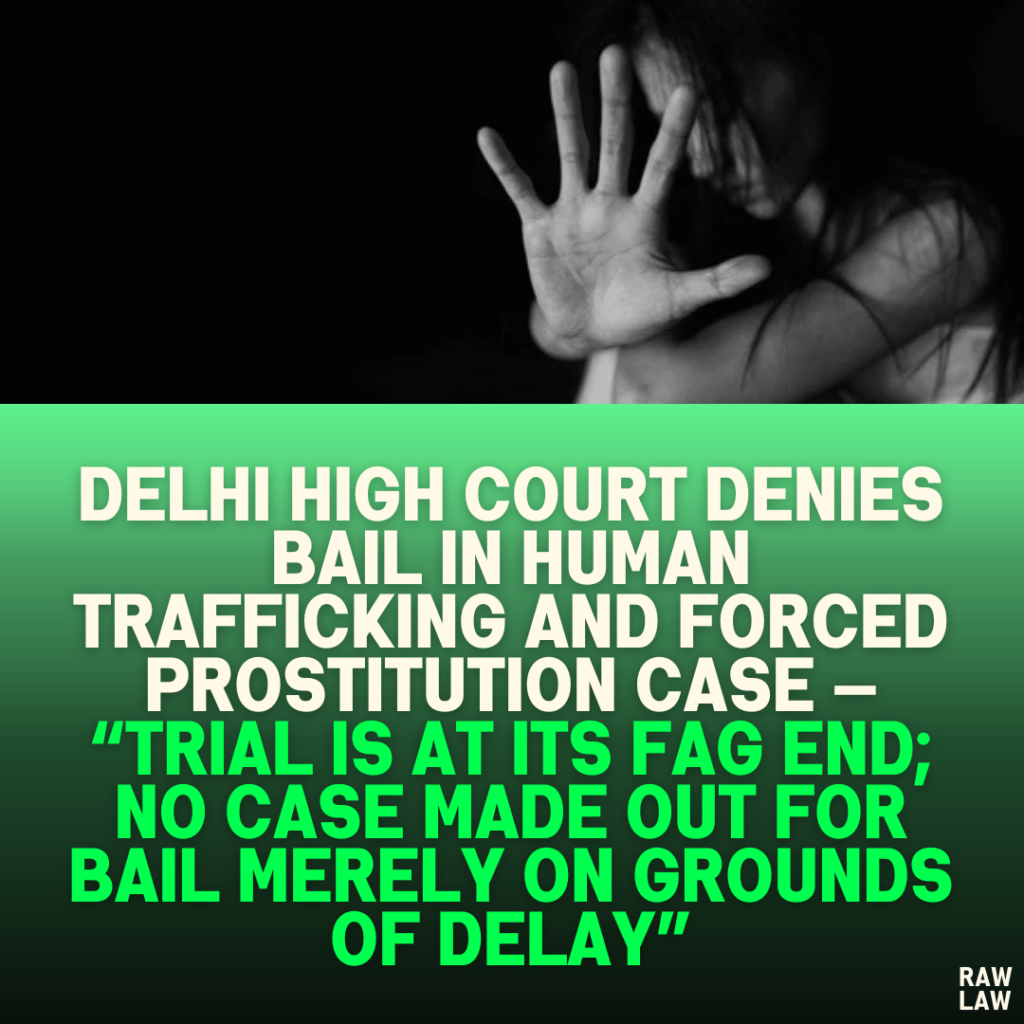Court’s Decision
The Delhi High Court dismissed the bail application filed under BAIL APPLN. 1395/2025, refusing to grant bail to the applicant accused in a case involving serious charges under IPC, ITP Act, POCSO Act, and JJ Act. The Court held that the case is not fit for bail due to the grave nature of allegations, advanced stage of trial, and absence of proof that trial delays were not attributable to the applicant. The Court emphasized:
“Trial is at its fag end and that in itself is an indicator against grant of bail.”
Facts
The case stems from FIR No. 186/2017, registered at PS Kamla Market. The allegations relate to the trafficking and forced prostitution of a Nepali woman. She escaped from a brothel on G.B. Road and lodged an FIR claiming that:
- She was induced by a fellow Nepali resident to come to Delhi for domestic work.
- Upon arrival, she was sold to an intermediary, who further sold her to the applicant running the brothel.
- She was then forcibly confined, beaten, drugged, and coerced into having sexual relations with 20 men against her will.
- During the course of the investigation, a second victim was also identified as having been similarly trafficked and forced into prostitution.
Issues
- Whether the applicant is entitled to bail solely on the ground of delay in trial.
- Whether any fresh circumstance has arisen since the previous bail denial, warranting a different outcome.
Petitioner’s Arguments
- The accused has been incarcerated for seven years.
- Despite the liberty granted by the Supreme Court to renew the bail plea in case of delay in trial, the trial has not yet concluded.
- Only one of the two victims has been examined so far.
- The next witness (second victim) is pregnant and will appear only in August 2025.
- The petitioner raised objections to the prosecution’s status report, alleging that it introduced incorrect claims regarding the second victim’s statements.
Respondent’s Arguments
- The earlier bail application had been dismissed up to the Supreme Court.
- The Supreme Court, after reviewing the testimony of the first victim, found no reason to grant bail on merits.
- Though liberty was granted to approach the trial court again if there was unreasonable delay, the trial is nearly complete, and the second victim is scheduled to testify soon.
- No trial court ordersheets were submitted to show that delays were not due to the applicant.
Analysis of the Law
The Court acknowledged that delay in trial is a relevant consideration for bail. However, it emphasized that:
- Bail cannot be granted merely on the basis of delay without assessing the nature of accusations, the stage of trial, and reasons for delay.
- Applicants must place trial court ordersheets on record to establish that delays are not caused by them.
Precedent Analysis
The Court relied on the Supreme Court’s earlier order dated 21.11.2022 in the same matter, wherein the apex court stated:
“After going through the statement of the prosecutrix (PW1), we find no reason to grant indulgence of bail to the petitioner pending trial at this stage.”
This served as the primary basis to reject the bail on merits previously, and the current request was assessed only from the lens of trial delay.
Court’s Reasoning
- The trial is at its final stage — only the second victim’s testimony is pending.
- The second victim is expected to testify in August 2025.
- The applicant failed to place trial ordersheets on record to show that delays were not due to her.
- Given the nature of the allegations and the timing, releasing the accused at this stage could undermine the integrity of the trial.
- Contentions regarding inaccuracies in the status report and alleged lack of incriminating material in the second victim’s statement were not sufficient to justify bail.
Conclusion
The Delhi High Court held that the bail application lacked merit and dismissed the same. It reiterated that:
“Delay in trial is a ground for grant of bail. But that is not the only ground. The Court has to keep in mind overall circumstances.”
Implications
- The judgment reinforces the principle that mere delay in trial does not entitle an accused to bail, especially in serious human trafficking and sexual exploitation cases.
- It highlights the importance of applicants providing proof that trial delays are not due to their own conduct.
- The ruling underscores the judiciary’s commitment to safeguarding the interests of victims and ensuring the timely conclusion of trials in heinous offenses.



